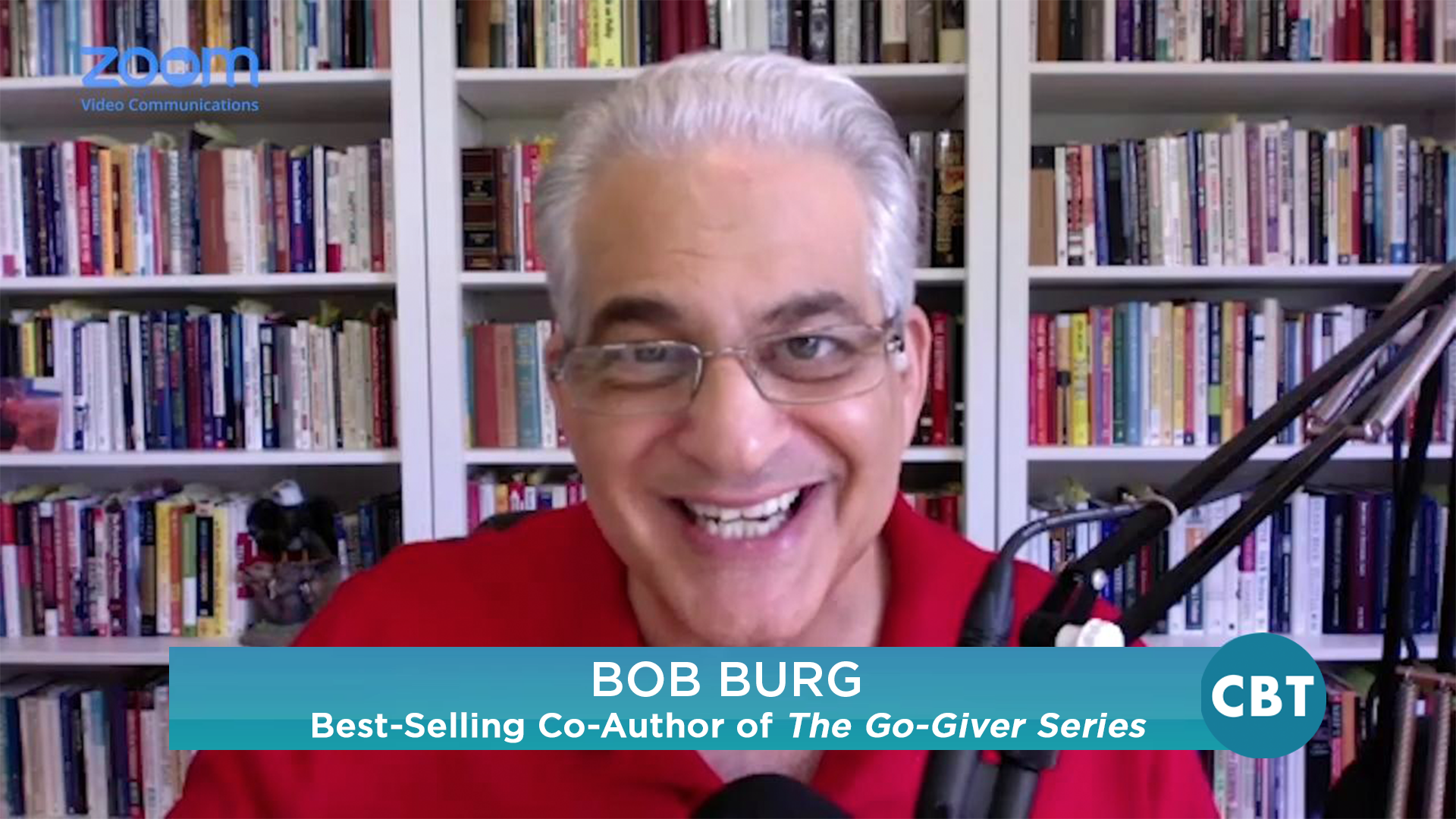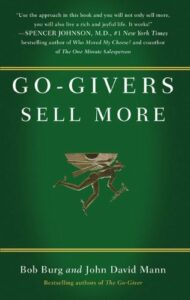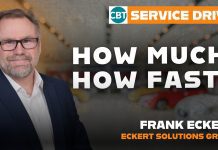What makes a great salesperson great at sales? Is it all about the numbers, or is it about having the right mindset and building positive relationships? The answer might not be what you’re expecting. To find out more, we recently welcomed back Bob Burg, world-renowned sales trainer, popular podcast host, and Wall Street Journal best-selling co-author of the “Go-Givers Sell More”.
Jim Fitzpatrick: Welcome back to the show, Bob.
Bob Burg: Thanks, Jim. Always great to be with you.
Jim Fitzpatrick: Sure. So good to have you. So first of all, what makes a great salesperson great at sales? Is it all about the numbers?
Bob Burg: No, no. The numbers are the result of the greatness of that salesperson, let’s say, the effectiveness of that salesperson. I think there’s a couple questions in there. I think first of all, what makes a salesman or saleswoman or salesperson great or effective, and that’s fine. And then there’s the question what separates the really great ones, the top of the line?
Jim Fitzpatrick: The superstars.
Bob Burg: Right, exactly. And I think it begins with certain things. People might say, “Well, what makes a great salesman great?” Is it their product knowledge? And certainly, great salespeople tend to have really good product knowledge. They know their product. But you know what, a lot of lousy salespeople and middle of the road salespeople also have good product knowledge.
Jim Fitzpatrick: This is true.
Bob Burg: So is it important? Of course. Is it the separator? Nah.
Bob Burg: So then there’s they really believe in their product, and again, do typically excellent salespeople believe in their product or service? Of course, they do, but so do a lot of lousier, middle of the road salespeople. Is it important? Yeah. But it’s not the determining factor.
And then there’s what about sales training, sales skills? Great salespeople certainly continue to hone and learn and master. Of course, they do. But interestingly enough, so do many middle of the road and lousy salespeople. So is it important? Yeah, but it’s not enough.
Bob Burg: All of those things are entry-level type of things, right? So what does separate the great ones from the average ones, or even the somewhat successful ones? And really what it comes down to is their focus is in the right place. They actually place the interest of their prospective customers and clients ahead of themselves.
Adam Grant and his great book Give and Take cited a study of Australian financial advisors, stockbrokers, and again, it was really separated the top of the line, the top producers, top money earners. And of course, financial acumen was important, but a lot of people have that. No. Ability to work hard, sure. But a lot of people had that. No. It was these people placed the interest of their customers, clients, prospects, what have you ahead of themselves and even ahead of their own companies, and as a result, they were so enormously successful themselves. And I think that’s really what it’s about. It’s understanding that great salesman, just like great leadership, is not about the leader but about those you lead. Great salesmanship is not about the salesperson. It’s not about the product or service, as important as the product or service is. It’s about the other person and how they are going to benefit from it.
Jim Fitzpatrick: Boy, that’s for sure. That’s for sure. Changing gears a little bit, you’ve been a sales trainer for decades and been all over the globe speaking to groups large and small, working on a consultant basis with many companies. What makes the methodology behind your book different from traditional sales training?
Bob Burg: Well, the book itself, The Go-Giver, is a business parable. So while it sets down five laws, it really kind of goes a 30,000 put view. My first book Endless Referrals: Network Your Everyday Contacts Into Sales, that was a how-to book. And that’s been utilized a lot in the automotive industry. But they’re two separate kinds of books because what is the… One’s sort of the how-to aspect of the other. So while we might say, “Well, the book focuses, again, on the value you bring to others.” I think a lot of books out there do that. I think more and more there’s great books out there and great videos and excellent teaching that basically say, “Hey, guys. This is how it is. It’s not about us. If you really want to have a sustainable business, a profitable business, a business that you enjoy, that aligns, that’s congruent with your values, and that serves everyone, this is the way to do it.” So while I think John David Mann and I present The Go-Giver message in a certain way that’s beneficial, I think there’s a lot of great book sou there. I read a lot of them and I learn from every one of them.
Jim Fitzpatrick: What are the most common mistakes and pitfalls that salespeople find themselves in from your perspective?
Bob Burg: I think it always comes down to the focus being in the wrong place, and that is either on yourself or on the product or service. I remember Chris Voss. He wrote the great book on negotiation. He was the former FBI. He said Never Split The Differences. That’s the name of his book. Never Split The Difference. He said in negotiation, he was involved in a high-level FBI hostage situations.
And he said the biggest mistake a negotiator ever makes is forgetting that it’s all about the other person. It’s about that person who has taken a hostage. You’ve got to find a way to connect with them. It’s not about, “Oh, I really need this hostage back.” They don’t care.
Jim Fitzpatrick: Right, right. It’s a good point.
Bob Burg: And I think that’s really what it comes down to. It comes down to that focus being not on the other person.
Jim Fitzpatrick: Can those mistakes be avoided do you think that salespeople make? Can they change?
Bob Burg: Yeah. Well, I think we have to be conscious of it because remember, Jim, we’re human beings. We are ourself interesting creatures. That’s how we’ve been able to multiply and have generations. We are self-interested. And so it’s not a matter of denying our self-interest. No, human nature is human nature. Successful people live in truths. They understand truths. They embrace the truth. Now that doesn’t mean they settle for the results of those truths. No. But they understand, they learn, they embrace. They work within those truths in order to make the situation better. So no, don’t deny yourself interest. You are in self-interest. You are self-interested. So am I. Okay?
What we would suggest is temporarily suspend your self-interest. Just kind of put it off to the side a little bit. That will allow you to focus on that other person. Now of course when you do that, you’re going to probably have better results, which is basically in your best self-interest. So it’s wonderful how life works, that grand paradox if you will. But can people learn to do this? Well, absolutely. That’s the whole thing about this. But to do that, first, a person has to kind of come to grips with or understand that the way they’re currently doing it may not be getting them the kind of results that they’d really like. Because, let’s face it if we’re happy with the way everything is, why change?
Jim Fitzpatrick: That’s right. In your book, Go-Giver’s Sell More, you outlined five laws to stratospheric success. Can you go through a couple of them for us and how they relate to sales?
Bob Burg: Yeah. Well, the first one is the law of value, and the law of value simply says your true worth in the business sense is determined by how much more you give in value than you take in payment. When you first hear that, it’s kind of counterintuitive, right? It sounds like you’re not making a profit. You’ve more in value than I take in payment. That’s a recipe for bankruptcy, right? So we simply have to understand the difference between price and value. Price is a dollar figure. It’s a dollar amount. In other words, it’s finite. It is what it is. Value, on the other hand, is the relative worth or desirability of a thing to the end-user or the holder. In other words, what is it about this thing, this product, service, concept, idea, vehicle doing business with us that brings so much worth or value to another human being that they will willingly, again, free market. They will willingly exchange their money for this.
So when you help someone own a car, they may have paid you X amount of dollars, but what are they getting from it? Well, they’re getting the vehicle they want. It feels good, or maybe it’s a sense of safety. Or maybe it’s status, or maybe… Whatever it is, they are deriving more in use value from that than what they paid. Otherwise, they wouldn’t have done it. Economic law says we exchange money for that which we feel is a great value than the money we’re exchanging it for. So they got more value, more value than what they paid, but of course, you and the dealership also made a healthy profit, which you should.
Now let me go just a bit deeper here if I may. Because the value that you’re provided… Again, just intrinsically by what you do, you’re helping them have more in value than what you take in payment. But you’ve got a lot of competitors out there. They have the same basic automobiles. They’re priced basically the same. And if you can’t distinguish yourself between… If a prospective customer cannot distinguish between any two automobiles or two or three or four or any auto, they’re always going to go with that dealership and salesperson who has the lowest price. And unless your last name is Walmart or Amazon.com, try to make low price your unique selling proposition’s not a good way to do business. Okay?
Jim Fitzpatrick: That’s right. That’s right.
Bob Burg: When you sell on price, you’re a commodity. When you sell on value, you’re a resource. So the question is how do you make yourself more valuable?
Jim Fitzpatrick: Well, Bob Burg, bestselling author, incredible speaker, unbelievable sales churner. I want to thank you so much for joining us here on CBT News. This has been very enlightening. We get such great comments from our viewers and our subscribers every time you’re on. So thank you again for joining us. We really appreciate it. I know you’re a busy guy.
Bob Burg: Thank you, Jim. I appreciate you and your entire team. Thank you so much.
CBT Automotive Network, the number one most-watched network in retail automotive. This has been a JBF Business Media production.









